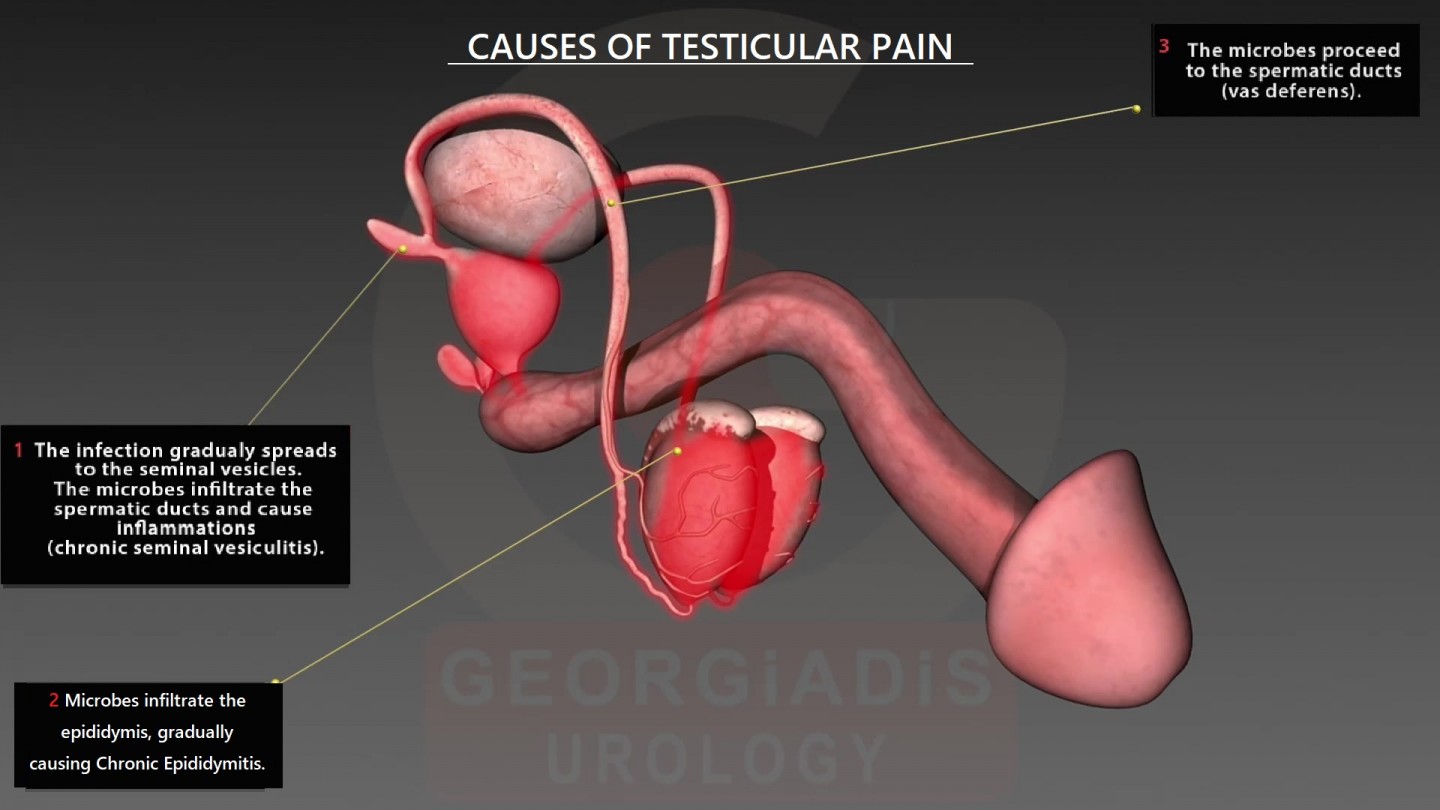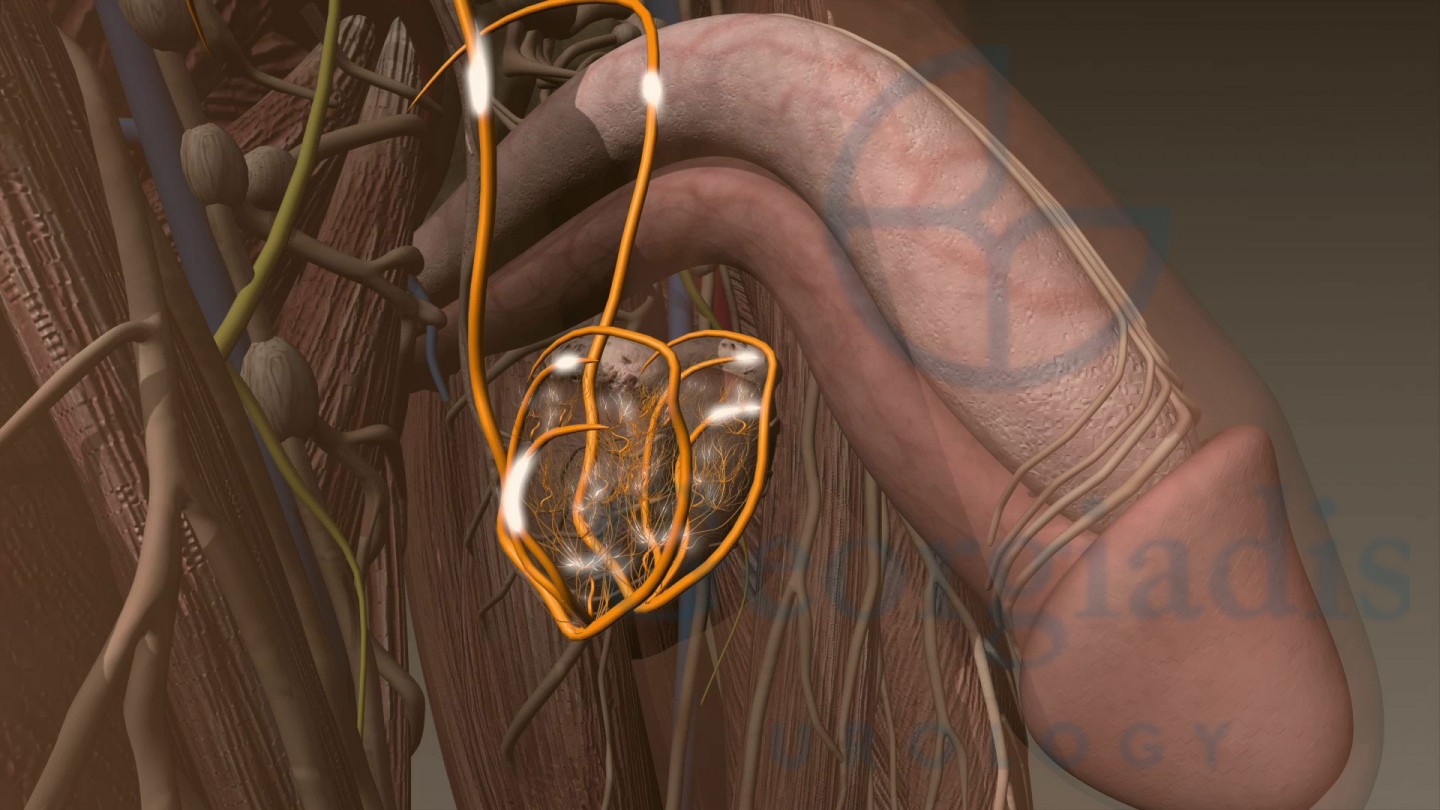Testicular Pain
What is testicular pain?
Testicular pain refers to a feeling of pain of variable degree in the testicles. The pain can be sharp or temporary, constant or recurring and / or there can be a feeling of heaviness on the testicles with oscillating intensity. The severity of each testicular pain situation depends on the causing factor which may vary.
Causes of Testicular Pain
Testicular pain has many causes, some of which may require very urgent medical care.
Epididymitis
Inflammation of the epididymis is always due to infection. It is the most common cause of pain in the testes for men between the ages of 18 to 45 years old. In sexually active men, the most common cause of epididymitis are sexually transmitted diseases, such as gonorrhoea, chlamydia, e. coli, klebsiella, enterococcus, staphylococcus species etc. In younger men, a very common cause of an epididymis infection, is a direct migration of the infection from the prostate towards the epididymis.

Figure 1: There is a direct microbial migration from the chronic prostate inflammation through the spermatic ducts. This migration goes towards the epididymis, which ultimately results in Epididymitis.
Chronic Prostatitis
Chronic inflammation of the prostate can lead to testicular pain due to its caused neural plexus strangulation. The pain is then reflected through the neural pathways towards the testicles. This is one of the most common but subtle causes as doctors often misdiagnose patients with chronic epididymitis. This happens due to the locality of pain in the testicles.

Figure 2: Reflection of pain through the neural pathways from the inflamed prostate towards the testicles.
Trauma
Trauma to the testicles often produces a painful feeling. A direct blow to the scrotum is very painful, but it usually is temporary and subsides relatively quickly. Potential scenarios:
- In the majority of cases, it can lead to bruising which subsides within two weeks.
- Occasionally, the wound can cause more serious injury that may require urgent surgery, such as the following cases:
- Hematocele: A collection of blood inside the testicle sac layers.
- Rupture: The tearing of the tunica albuginea of the testicles, which results in the extrusion of the testicular contents.
Varicocele
This is a pathogenic expansion of the veins in the spermatic cord. Among many other symptoms, varicoceles can result in a feeling of heaviness or pain in the testicles.
Torsion of the testis
This is a medical emergency and occurs when a testicle rotates within the scrotum. This causes strangulation of the blood vessels (contained in the seminal tone) resulting in the interruption of blood supply to the testicle.
Because blood contains oxygen and testicles need oxygen to stay alive, twisting can lead to the gradual “death” of the testicles. Thus, testicular torsion requires urgent surgery to save the testicle. Testicular torsion can occur at any age but it is most common during the first months of life (infancy) and to boys between the ages of 12-18 years old. It occasionally occurs in men aged between 20 to 30 years old. This is due to an abnormal attachment of the epididymis to the scrotum wall. Many of these men have the same abnormalities of adhesion in both testicles.
Torsion of testicular appendage / apophysis
This is a common cause of testicular pain in younger boys. Nearly all cases occur between the ages of 3-14 years old. The apophysis/outgrowth of the testis is basically a functional structure that is in a groove between the testis and epididymis. Just as in a testicle, this structure can have its blood flow reduced due to torsion, thus causing pain of varying intensity.
Inguinal hernia
This condition occurs when part of the intestine comes out through an opening of decreased resistance in the abdominal wall and descends into the scrotum. This can cause pain or swelling.
Less Common Causes of Testicular Pain
Orchitis
This is also known as inflammation of the testicles and should not be confused with epididymitis, which is inflammation of the epididymis only. This inflammatory condition occurs because of a process of infection. It sometimes accompanies an epididymitis, especially when the epididymis is left untreated for days. Most cases of orchitis are caused by a viral infection such as mumps, although other viruses and bacteria can cause it too.
Testicular tumor
A tumour rarely causes pain but can cause swelling and often a feeling of heaviness in the testicle. Early detection and prompt surgical removal can significantly improve the prognosis for survival of patients with testicular cancer.
Kidney stones
Pain from kidney stones can sometimes radiate to the groin area in a similar fashion to that of Chronic Prostatitis (i.e. through the pelvic neural pathways).
